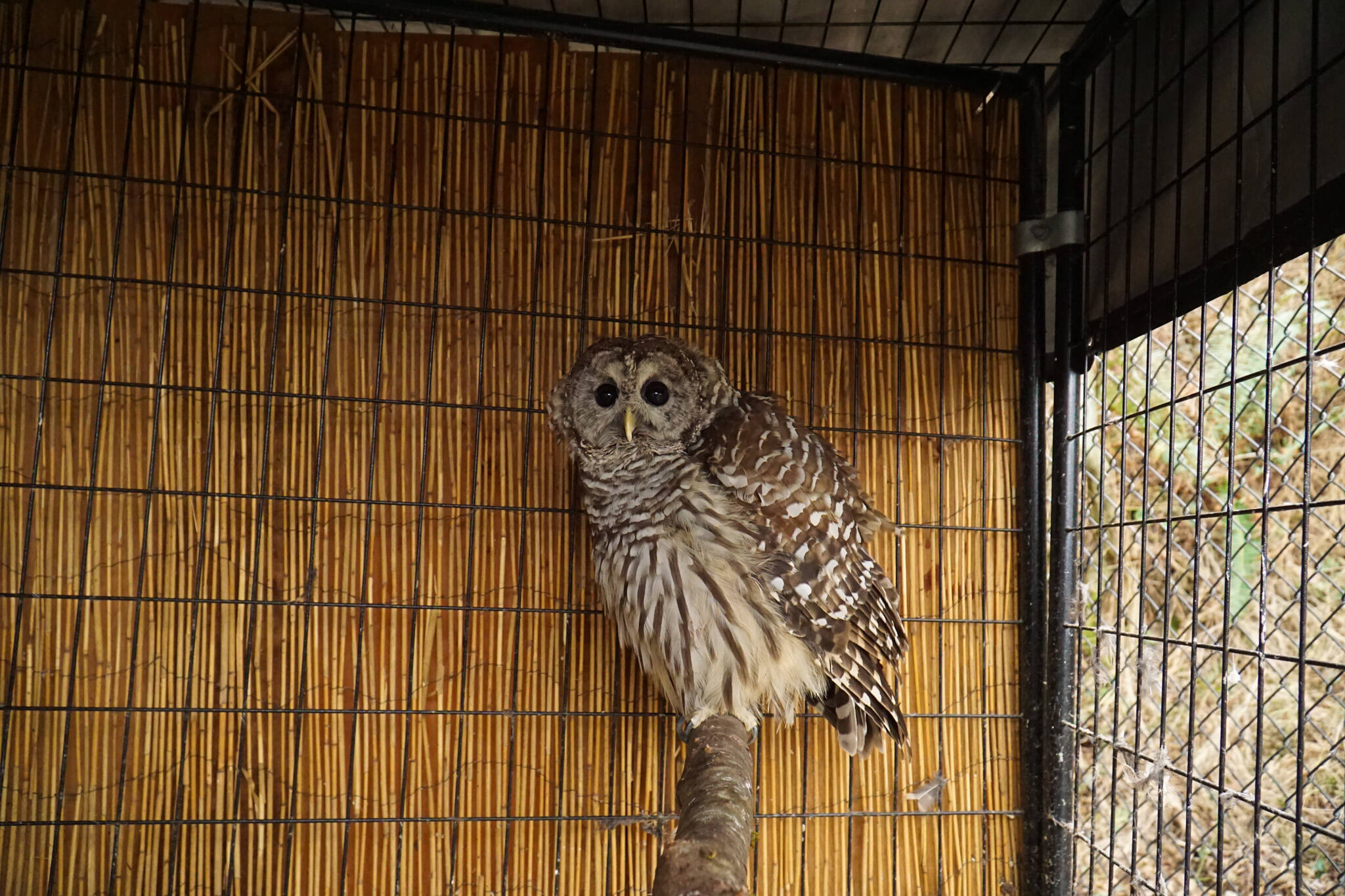Life’s greatest joy for Dave Coleburn, owner of Northwest Wildlife Sanctuary off State Route 20 near Deception Pass, comes from interacting with animals.
“I still get the same feelings I did 20 years ago,” he said, lifting a candy bar high in the air so his wolves stand on their hind legs. “It’s like looking over the edge of the Grand Canyon for the first time. I get that feeling every day.”
Coleburn’s tours start with a video on wolves. From there, guests explore rooms of porcupines, snakes, alligators, tortoises, lizards, badgers, owls, raccoons, sloths, binturongs, a Siberian lynx and much more.
Northwest Wildlife Sanctuary belongs to the Northwest Animal Rescue network, so they often host animals in need, he said. Almost all the reptiles Coleburn currently cares for are rescues. Animals also come on loan from zoos across the country.
Coleburn said his first company, a nonprofit organization called Predators of the Heart, started as a traveling show in 1998. He gave presentations at school assemblies on animals as part of a drug and alcohol education program, which eventually evolved into strictly wildlife education.
In 2017, he set up shop in Anacortes to be an Airbnb experience — a new concept at the time — and quickly became number one in the world. Predators of the Heart became world famous, with tourists coming from all over, sometimes just for one day.
The board of directors terminated Coleburn’s employment and affiliation with Predators of the Heart in 2020, citing several complaints, including negligent misrepresentation and fraud.
“It was terrible,” Coleburn said. “It was a hostile takeover.”
Northwest Wildlife Sanctuary opened its doors in March 2023 and runs at a slower pace.
There are a lot of differences between the two businesses, Coleburn said. Northwest Wildlife Sanctuary runs just Thursday through Saturday to maximize animal comfort. Kids are allowed to come. They have fewer wolves, but a greater variety of animals. They let very few people in at a time to maximize intimate animal interactions, which is rare in the industry.
The Whidbey Island community have been very supportive, he said as he opened the enclosure door so Tasha, the Siberian lynx, can roam about freely. Fewer tourists come now, and instead many of the same guests come again and again.
Tasha ran to the front, hanging her head over the alligator snapping turtle pond. For the most part the animals are safe for him to interact with, Coleburn said, even the large predators like mountain lions and wolves. Training starts when they are babies; at that point he learns what they like and don’t like.
“Treat them with respect, that’s the main thing,” he said. “With the wolves, you never hit them. You never yell at them. You never scare them.”
Much of animal safety comes from building rapport, he said. Tasha, for example, may act differently under a new owner.
“If she went somewhere else with somebody, she would turn into a Tasmanian devil,” he said.
Badgers bite hard as a black bear, he said, but his hardest bite came from a turtle.
“My dad said if you’re going to be stupid, you gotta be tough,” he said.
Through the back door, Coleburn led the way past a couple of barred owls, a Eurasian eagle-owl, an augur hawk which was the model for the Seahawks logo, skunks and a raccoon named Church. Passing a garden, where much of the animals’ food is grown, he arrived again at two wolves wrestling in the back.
Nightly these wolves, Tahoe and Sierra, eat ten pounds of chicken, turkey, beef or pork, he said.
Some of the wolves that Coleburn bred have become movie stars, he said. They were used in the “John Wick” franchise, “Game of Thrones” and “True Blood.” Siblings of Tahoe and Sierra are ambassador animals, an interactive program at the San Diego Zoo.
With today’s prevalence of phones and the internet, most kids don’t experience wildlife in their day-to-day lives the way Coleburn did when he was a kid. He’s honored to introduce them to it, he said.
Coleburn’s animals have put people on a new life path. Countless times guests have approached him and said, “Do you remember me? You changed my life,” he said.
Animals can give people confidence if they are nervous around humans. One of his former employees was brilliant and could have taught about animals in universities, Coleburn said, but he had autism and difficulty speaking in front of people. Through interacting with animals, his confidence as a speaker grew.
Today, Coleburn considers himself mostly retired. His focus is on covering the overhead costs versus making a large profit. In March, he’s building a pool for two new otters. This summer, he is going to host bird and reptile shows at no cost to the community.
Whidbey Island has been very supportive of this new venture, and he wants to give back, he said.



